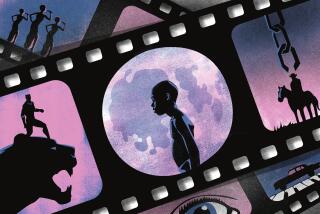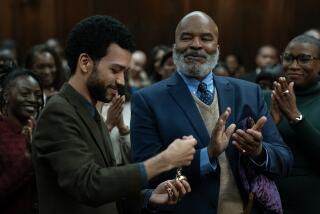Sam Greenlee dies at 83; wrote on being an African American in Foreign Service
Writer Sam Greenlee, whose novel “The Spook Who Sat by the Door” about his experiences as a rare black man working for the U.S. Foreign Service in the 1950s and ‘60s was turned into a 1973 independent film, has died in Chicago. He was 83.
He died from natural causes early Monday morning at his home, friends said.
“The Spook Who Sat by the Door” was Greenlee’s one feature film (he was writer and producer), adapted from his 1969 novel of the same name, which was an underground classic inspired, in part, by Greenlee’s own background working overseas from 1957 to 1965, stationed in Iraq, Pakistan, Indonesia and Greece before returning to Chicago.
Both the book and the film center on a black activist and intelligence man named Dan Freeman (played by Lawrence Cook) who quits the agency, moves back to Chicago and kick-starts an armed revolution steeped in black nationalism and groovy dialogue.
“It is such a mixture of passion, humor, hindsight, prophecy, prejudice and reaction,” New York Times critic Vincent Canby wrote upon the film’s release, “that the fact that it’s not a very well-made movie, and is seldom convincing as melodrama, is almost beside the point.” (The film was directed by Ivan Dixon, best known for his role on “Hogan’s Heroes.”)
But something strange happened shortly after the film opened in theaters. It disappeared for reasons that remain unclear. The prints literally vanished.
Greenlee believed movie theater owners were visited by the FBI and were pressured to pull the film from their screens. It’s not an implausible theory, considering the story’s militant content, but it’s one that has never been proved. That didn’t stop Greenlee from speaking out, anyway.
Charming and graced with a wily, indefatigable intellect, Greenlee sat for many interviews in his later years, including one for the 2011 documentary “Infiltrating Hollywood: The Rise and Fall of the Spook Who Sat by the Door,” which chronicled the story of the film’s making and subsequent disappearance.
Numerous video interviews of Greenlee abound on YouTube, including one in which he is unsparing in his opinion of contemporary black cinema: “If we’re gonna be outsiders, man, (let’s) take advantage of being outsiders, OK?.... If you want to say something true about black people, then do what we did: Raise the money from the black community and shoot what you want.”
Greenlee was born in Chicago on July 13, 1930. He attended the University of Wisconsin, where he ran track, and the University of Chicago. “I went to two white, brainwashing institutions,” he told the Chicago Reader. “But I’m the black dog that didn’t fall for Pavlov’s scam.”
“He often said and did some outrageous things,” said Stan West, a writer and filmmaker who teaches culture, race and media at Chicago’s Columbia College, “sometimes for shock value, sometimes because he believed them and sometimes because of his various illnesses. Sam was one of the first African Americans I met who was in the U.S. Foreign Service. “
Greenlee served in the Army from 1952 to 1954. After graduate work at the University of Chicago, in 1957 he went to work for the U.S. Information Agency and became a foreign service officer. He resigned in 1965, the year of L.A.’s Watts riots.
“I knew that was the first in a series of rebellions,” he said in an interview for a Times article in 2004, “so I decided to write about what I thought was going to happen.”
The book was originally published in England in 1966 then released by Bantam in the United States three years later.
“I thought the book represented the fantasy of every black man or woman at one time or another in this country,” Dixon, who co-produced and directed the film, said in 2004 when it was released on DVD. “It relates to the history of blacks in America, and the social situation of blacks in America at that time or at any time.”
Greenlee had been around the world but returned to the neighborhood he grew up in to write poetry and another novel, “Baghdad Blues” (1976).
“I don’t write for black bourgeois intellectuals,” he said in an interview for the DVD release. “I write for the people on the block where I live.”
More to Read
Start your day right
Sign up for Essential California for the L.A. Times biggest news, features and recommendations in your inbox six days a week.
You may occasionally receive promotional content from the Los Angeles Times.







